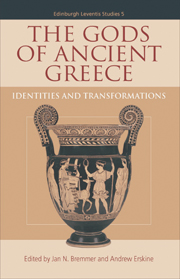Book contents
- Frontmatter
- Contents
- Preface
- List of Illustrations
- Notes on Contributors
- List of Abbreviations
- Introduction: The Greek Gods in the Twentieth Century
- 1 What is a Greek God?
- PART I SYSTEMATIC ASPECTS
- PART II INDIVIDUAL DIVINITIES AND HEROES
- PART III DIACHRONIC ASPECTS
- 14 Early Greek Theology: God as Nature and Natural Gods
- 15 Gods in Early Greek Historiography
- 16 Gods in Apulia
- 17 Lucian's Gods: Lucian's Understanding of the Divine
- 18 The Gods in the Greek Novel
- 19 Reading Pausanias: Cults of the Gods and Representation of the Divine
- 20 Kronos and the Titans as Powerful Ancestors: A Case Study of the Greek Gods in Later Magical Spells
- 21 Homo fictor deorum est: Envisioning the Divine in Late Antique Divinatory Spells
- 22 The Gods in Later Orphism
- 23 Christian Apologists and Greek Gods
- 24 The Materiality of God's Image: Olympian Zeus and Ancient Christology
- PART IV HISTORIOGRAPHY
- Epilogue
- Index
20 - Kronos and the Titans as Powerful Ancestors: A Case Study of the Greek Gods in Later Magical Spells
from PART III - DIACHRONIC ASPECTS
Published online by Cambridge University Press: 05 August 2013
- Frontmatter
- Contents
- Preface
- List of Illustrations
- Notes on Contributors
- List of Abbreviations
- Introduction: The Greek Gods in the Twentieth Century
- 1 What is a Greek God?
- PART I SYSTEMATIC ASPECTS
- PART II INDIVIDUAL DIVINITIES AND HEROES
- PART III DIACHRONIC ASPECTS
- 14 Early Greek Theology: God as Nature and Natural Gods
- 15 Gods in Early Greek Historiography
- 16 Gods in Apulia
- 17 Lucian's Gods: Lucian's Understanding of the Divine
- 18 The Gods in the Greek Novel
- 19 Reading Pausanias: Cults of the Gods and Representation of the Divine
- 20 Kronos and the Titans as Powerful Ancestors: A Case Study of the Greek Gods in Later Magical Spells
- 21 Homo fictor deorum est: Envisioning the Divine in Late Antique Divinatory Spells
- 22 The Gods in Later Orphism
- 23 Christian Apologists and Greek Gods
- 24 The Materiality of God's Image: Olympian Zeus and Ancient Christology
- PART IV HISTORIOGRAPHY
- Epilogue
- Index
Summary
There are some obvious and therefore less interesting ways in which the Greek gods show up in the magical texts of later antiquity. Sometimes the process involves shrinking a large-scale communal sanctuary down to the size of a personal shrine that can be placed in a house or even on top of a table. Thus Eitrem showed long ago how a series of divination spells in the Greek magical handbooks invoke Apollo by traditional cult names and require various implements and images associated with his oracular sites in Delphi, Klaros and Didyma. Indeed, one spell instructs us how to assemble a miniature temple for the god, replete with a small Delphic tripod and a laurel-bedecked cult statue. In addition to expropriating and miniaturizing Apollo's shrine, the hymns embedded in the recipe equate the god himself with Helios, the Jewish angels Gabriel and Michael, and the Egyptian sun god Re. Another unremarkable kind of survival is when chthonic deities like Hermes or Persephone continue to be invoked in cursing rituals that have clearly evolved from much earlier Greek defixiones, as in this archetype of a popular binding spell reconstructed from a recipe in PGM IV 335–406 and five lead curse-tablets, all of which were found in Egypt and date to the fourth century AD:
I deposit (παϱακατατίθεμαί) this binding charm (κατάδεσμος) with you, chthonic gods, Plouton uesemigadôn and Kore Persephone Ereschigal and Adonis also called barbaritha, and Hermes Katachthonios Thoth phôkensepseu arektathou misonktaik and mighty Anubis psêriphtha, who holds the keys of the gates to Hades, and chthonic demons, gods, men and women who suffered untimely death, youths and maidens.
- Type
- Chapter
- Information
- The Gods of Ancient GreeceIdentities and Transformations, pp. 388 - 405Publisher: Edinburgh University PressPrint publication year: 2010



